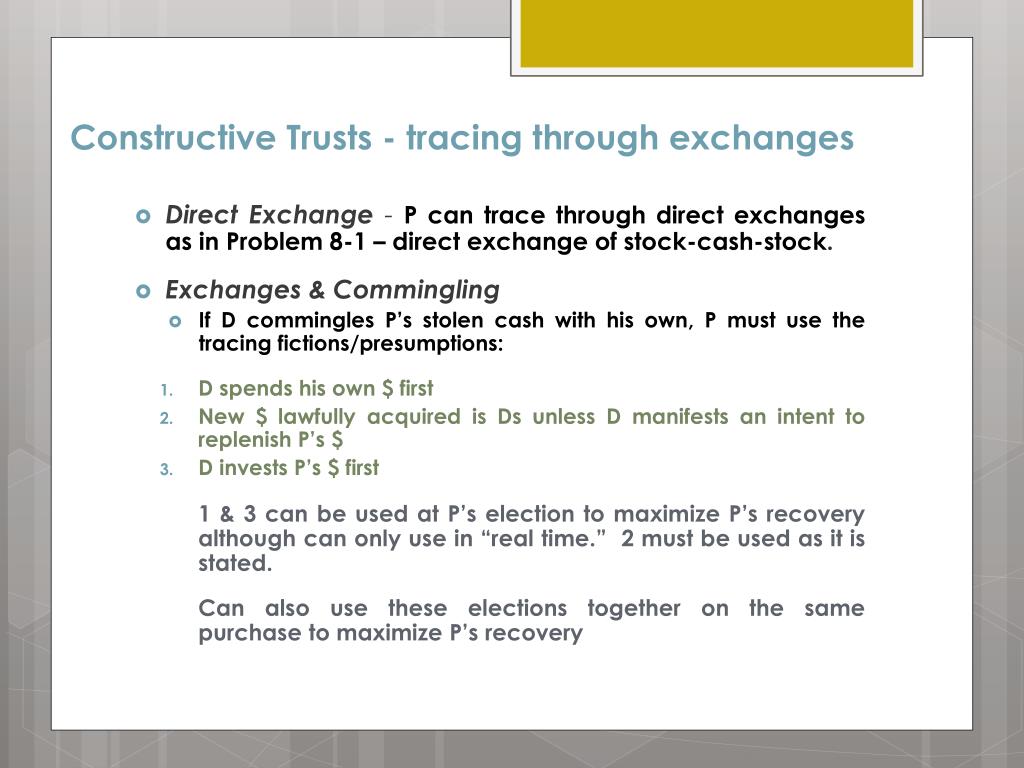Understand the Laws Behind What Is A Constructive Trust and Its Legal Purpose
Understand the Laws Behind What Is A Constructive Trust and Its Legal Purpose
Blog Article
Unveiling the Advantages of a Constructive Count On Managing Beneficiary Conflicts
The concept of a useful depend on arises as a pivotal tool in the intricate realm of beneficiary conflicts, offering a nuanced solution to disputes that typically develop from wrongful property retention. By fostering a fiduciary relationship in between events, this fair solution not just assists in speedy resolutions yet likewise offers to deter potential transgression. As we check out the multifaceted benefits of constructive depends on, one may start to question exactly how these mechanisms can reshape the landscape of estate disagreements and add to a more equitable circulation of properties among beneficiaries.
Definition of Constructive Count On
A constructive trust is frequently developed by courts to attend to situations where one event has actually wrongfully acquired or maintained residential property that truly comes from another (What Is A Constructive Trust). This lawful idea is not a conventional trust, as it does not call for the procedures typically associated with count on production, such as a written agreement or the purpose of the parties involved. Instead, a useful trust fund develops by procedure of law, acting as a fair remedy to avoid unjust enrichment
The courts impose a useful count on when it is identified that a person party holds property under situations that, in equity and great principles, need to not permit them to keep it. Typical situations include deceptive actions, breaches of fiduciary obligation, or situations where a party has actually gotten property with inappropriate ways. The useful trust hence works to protect the legal rights of the rightful proprietor by guaranteeing that the building is held for their benefit.
Once established, the useful depend on calls for the event in possession of the home to communicate it to the rightful proprietor, hence fixing the wrongful scenario. This system emphasizes the lawful system's dedication to justness and justice in property disputes, emphasizing the importance of ethical conduct in ownership and transfer of assets.
Benefits of Constructive Counts On
Constructive counts on provide several significant benefits in lawful disputes including residential property civil liberties. Mostly, they act as an equitable treatment, allowing courts to address situations where an event has wrongfully obtained or preserved property that truly comes from one more. This establishes a structure for justness, making sure that the rightful owner is compensated and the unjustified enrichment of the wrongdoer is stopped.
In addition, useful counts on can expedite resolution in problems over estate possessions, thus reducing the lengthy and often controversial lawsuits processes connected with standard residential property disputes. Their versatility allows courts to customize treatments to fit the details scenarios of each case, which can cause more acceptable end results for all parties involved.
Furthermore, constructive depends on promote transparency and liability among fiduciaries and beneficiaries, as they need the last to act in the finest interests of the previous. This enhances the stability of fiduciary partnerships, fostering depend on and cooperation. By discouraging misbehavior associated to property ownership, useful depends on add to the overall stability of lawful and economic systems, ensuring that home legal rights are valued and promoted within culture.
Just How Positive Trusts Job

In method, when a useful depend on is enforced, the court determines the home concerned and develops a fiduciary partnership in between the celebrations included. The party that holds the property becomes a trustee, bound to handle it for the advantage of the rightful owner, called the beneficiary. This relationship is not based on an official agreement however rather on the concept of equity, aiming to rectify situations where one celebration's gain straight associates with an additional's loss.

Situation Studies and Examples
When checking out the functional application of useful trusts, various instance research studies illustrate how courts browse complicated situations entailing unfair enrichment. One notable instance is * Pettkus v. Becker *, where the High Court of see page copyright established a positive depend on to correct the unjust enrichment of one party over one more in a long-term partnership. The court determined that the payments of one partner to the purchase of residential property justified the charge of a constructive count on, making certain equitable circulation.
An additional significant instance is * Gisborne v. Gisborne *, where the court enforced a useful count on to resolve the claims of siblings over their dead sibling's estate. The court acknowledged the payments made by the brother or sisters in keeping the family members residential property, causing a choice that required the estate to account for those contributions, consequently avoiding unjustified enrichment.
These cases exemplify just how constructive counts on can properly deal with conflicts by concentrating on justness and the avoidance of unjust enrichment. By analyzing the certain payments and circumstances of the parties included, courts can use positive trusts to achieve just end results, eventually enhancing the equitable principles underpinning these legal mechanisms.

Actions to Develop a Useful Count On
To develop a constructive depend on, numerous key steps have to be followed to guarantee that the case is substantiated and lawfully acknowledged. The claimant should show the presence of a fiduciary partnership or a scenario that warrants the imposition of a constructive count on, such as scams, unfair enrichment, or a violation of obligation.
2nd, it is essential to gather and existing engaging proof that sustains the case. This consists of documents and testaments that highlight the conditions leading to the claimed wrongful retention of residential or commercial property or benefits by the trustee.
Third, the claimant ought to file a petition in the appropriate court, articulating the premises for asking for the charge of a useful count on. This petition should describe the specifics of the relationship and the unjust enrichment that demands the trust fund.
Verdict
In verdict, constructive depends on stand for an essential fair solution in the realm of beneficiary disputes, successfully resolving wrongful residential property retention and stopping unfair enrichment. Eventually, constructive trusts promote justness amongst beneficiaries, making sure that rightful possession is maintained and shielded.
A positive trust is regularly developed by courts to resolve situations where one party has wrongfully gotten or retained residential property read the full info here that truly belongs to an additional.The courts enforce a positive trust when it is determined that one party holds home under scenarios that, in equity and great principles, must not allow them to maintain it. By inhibiting transgression relevant to building possession, positive depends on add to the general stability of economic and lawful systems, making certain that home civil liberties are valued and maintained within society.
In practice, when a positive trust fund is enforced, the court determines the residential or commercial property in question and develops a fiduciary connection between the parties entailed. hop over to here What Is A Constructive Trust. The court determined that the payments of one companion to the acquisition of property justified the imposition of a positive trust, making sure fair distribution
Report this page